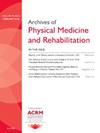参与农村护理人员评估,定制和实施整个健康护理人员茁壮成长计划,以不断适应和改进
IF 3.6
2区 医学
Q1 REHABILITATION
Archives of physical medicine and rehabilitation
Pub Date : 2025-04-01
DOI:10.1016/j.apmr.2025.01.077
引用次数: 0
摘要
在美国,大约有550万非正式护理人员(如家庭成员)协助日常生活活动和医疗任务。护理人员在为退伍军人提供支持方面至关重要,但往往会经历情绪和身体上的压力,这可能导致倦怠并影响护理能力。这项工作旨在让农村护理人员对护理人员进行评估、定制和实施“通过基于价值的经验整合转变健康和复原力”(THRIVE)计划。设计采用混合方法,以人为中心的设计方法来开发和评估干预内容。美国东南部一家退伍军人事务(VA)医院的整体健康服务旗舰店。由于远程招募,参与者在地理上分散。参与者是非正式照顾者(即队列1,n=13;队列2,n=22)为退伍军人退伍军人患者。interonsthrive是一个为期7周的远程提供循证VA项目,旨在提供基于补充和综合健康(CIH)的自我保健服务。这个项目最初是为退伍军人和退伍军人管理局的员工开发的。改编后的“照顾者茁壮成长”计划解决照顾者的健康和生活质量问题,包括倦怠;健康与健康;正念;以及基于价值观的生活。主要结果测量主要结果测量包括倦怠、内疚、正念、精神和身体相关的生活质量。结果大多数参与者来自农村(38.31%),白人(74.67%),平均年龄61岁,已婚,女性照顾者(86.36%),大专及以上学历(64.29%)。照料者茁壮成长普遍受到好评,并被认为是有益的。结果包括倦怠(SMD, - 0.13)、内疚(SMD, 0.23)、正念(SMD, 0.46)、心理健康相关生活质量(HRQoL) (SMD, 0.25)和身体HRQoL (SMD, 0.24)的改善(以标准化平均差异[SMD]衡量)。程序前到程序后的变化分数表明(生活质量)可能有所改善(SMD, 0.24;ES、小)。结论scaregiver THRIVE具有帮助护理人员获取知识和技能以保持健康的生活方式、创建社区和减少倦怠的潜力,特别是对于农村的护理人员。与护理人员的定期评估对于持续适应和计划改进至关重要。这项工作得到了退伍军人事务部、退伍军人卫生管理局、农村卫生办公室、退伍军人农村卫生资源中心退伍军人卫生管理局、农村卫生办公室、退伍军人农村卫生资源中心——爱荷华州爱荷华市(NOMAD projo -03860)的支持,IRBNet #1714908-2。这是利用詹姆斯·a·哈利退伍军人医院的资源和设施及人员支持工作的结果。内容不代表美国政府退伍军人事务部的观点。本文章由计算机程序翻译,如有差异,请以英文原文为准。
Engaging Rural Caregivers to Evaluate, Tailor, and Implement the Whole Health Caregiver THRIVE Program for Continuous Adaptation and Improvement
Objectives
Approximately 5.5 million informal caregivers in the United States (eg, family members) assist with activities of daily living and medical tasks. Caregivers are essential in providing support to veterans but often experience emotional and physical strain, which can result in burnout and impact caregiving capacity. This work aimed to engage rural caregivers to evaluate, tailor, and implement Transforming Health and Resiliency through Integration of Values-based Experiences (THRIVE) program for caregivers.
Design
A mixed-methods human-centered design approach was used to develop and evaluate intervention content.
Setting
A Whole Health service flagship at a Veterans Affairs (VA) hospital within the southeast United States. Due to remote recruitment, participants were geographically dispersed.
Participants
Participants were informal caregivers (ie, cohort 1, n=13; cohort 2, n=22) to VA veteran patients.
Interventions
THRIVE is a 7-week, remotely delivered evidence-based VA program designed to provide access to complementary and integrative health (CIH) based self-care. This program was originally developed for veterans and VA employees. The adapted Caregiver THRIVE program addresses caregivers’ wellness and QoL including burnout; CIH and wellness; mindfulness; and values-based living.
Main Outcome Measures
The main outcome measures include burnout, guilt, mindfulness, mental, and physical-related QoL.
Results
Majority of participants are rurally located (38.31%), white (74.67%), an average age of 61 years old, married, female caregivers (86.36%), with an associate's degree or higher (64.29%). Caregiver THRIVE was generally well-received and perceived helpful. Outcomes included improvements (as measured by standardized mean differences [SMD]) in burnout (SMD, −0.13), guilt (SMD, 0.23), mindfulness (SMD, 0.46), mental health-related quality of life (HRQoL) (SMD, 0.25), and physical HRQoL (SMD, 0.24). Preprogram to postprogram change scores indicated possible improvements for (QoL) (SMD, 0.24; ES, small).
Conclusions
Caregiver THRIVE has the potential to assist caregivers in acquiring knowledge and skills to maintain a healthy lifestyle, create community, and reduce burnout, particularly for rurally located caregivers. Periodic evaluation with caregivers appears crucial for continuous adaptation and program improvement.
Disclosures
This work is supported by the Department of Veterans Affairs, Veterans Health Administration, Office of Rural Health, Veterans Rural Health Resource Center Veterans Health Administration, Office of Rural Health, Veterans Rural Health Resource Center – Iowa City, Iowa City (NOMAD PROJ-03860) with IRBNet #1714908-2. This is the result of work supported with resources and the use of facilities and personnel at the James A. Haley Veterans’ Hospital. Contents do not represent the views of the Department of Veterans Affairs of the United States Government.
求助全文
通过发布文献求助,成功后即可免费获取论文全文。
去求助
来源期刊
CiteScore
6.20
自引率
4.70%
发文量
495
审稿时长
38 days
期刊介绍:
The Archives of Physical Medicine and Rehabilitation publishes original, peer-reviewed research and clinical reports on important trends and developments in physical medicine and rehabilitation and related fields. This international journal brings researchers and clinicians authoritative information on the therapeutic utilization of physical, behavioral and pharmaceutical agents in providing comprehensive care for individuals with chronic illness and disabilities.
Archives began publication in 1920, publishes monthly, and is the official journal of the American Congress of Rehabilitation Medicine. Its papers are cited more often than any other rehabilitation journal.

 求助内容:
求助内容: 应助结果提醒方式:
应助结果提醒方式:


